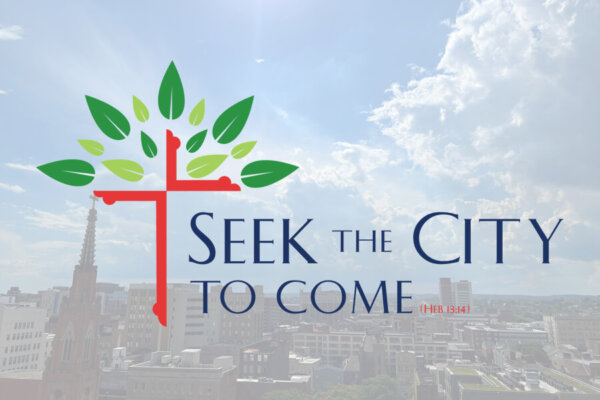For Immediate Release:
April 14, 2024
Contact: Christian Kendzierski
Tel. 410-547-5378
christian.kenzierski@archbalt.org
(BALTIMORE, MD) – The Seek the City to Come initiative has entered its public comment phase with a proposal for the Catholic Church in Baltimore City to include investment and ministries, the realignment of parish communities designed to offer a strong sense of belonging for all and the merging of parish campuses.
The proposal – which will be presented at two public comment sessions in late April – will be shared at weekend Masses with parishioners at 61 parishes across Baltimore City and some of the immediate suburbs. The proposal was developed over a nearly two-year period of conversations, study, prayer, analysis and reflection that captured and incorporated input from thousands.
Seek the City is a phased process that began in 2022 with open listening sessions, parish visits, prayer, research and hands-on building from pastors, parish leadership, parishioners and community members. The proposal is derived from the work that has occurred over the last 2 years and will be presented to Archbishop William Lori as a possible new landscape for the Church in Baltimore City.
Archbishop Lori said he will rely on feedback and direction from the public comment sessions and his consultations with Archdiocese leadership that include the Pastoral Council, the Presbyterate and various groups that include the Board of Financial Administrators, to guide the final decisions. The proposal reduces the number of worship sites to 26 while including the potential for the creation of multi-use spaces and new ministries. A final decision on the proposal is expected in June.
“We set out many months ago with a call to the faithful: Help the Church in Baltimore minister to our neighbors and respond to the needs of the city for the centuries to come as we have since 1789,” Lori said. “Together, we must design a plan that confronts decades of disinvestment and population loss in the city and brings the Eucharistic vision to life through mission and ministry.
“All are invited to review the proposal, speak up about unintended consequences and guide this fundamental decision for our future.”
Public comment sessions will be held on April 25 at Archbishop Curley High School and April 30 at Mount Saint Joseph’s High School. Both sessions will be from 6:30 to 8:30 p.m.
Schools that are connected to parish churches will not be affected by the proposal nor when final decisions are made. Schools will remain open and function as normal.
Proposed changes to the city landscape included both promise and will present challenges for some. Buildings that serve as spiritual places for families over generations will change, merge and possibly close as the archdiocese grapples with the changing landscape in Baltimore. The proposal addresses the realities of the city’s decreased population, deferred maintenance on the campuses, the number of available clergy and parishes where funerals, outpace Baptisms.
Proposal highlights include:
- With sustained evangelization and outreach in Baltimore’s storied historically Black neighborhoods, St. Ambrose would continue in Park Heights and St. Bernardine would remain a mainstay in Edmondson Village, along with a possible worship or ministry site in the Edmondson Village Shopping Center. New All Saints Parish would continue in the Liberty Heights neighborhood.
- A proposed merger between Sacred Heart of Jesus in Highlandtown and Holy Rosary in Upper Fells Point would integrate customs and culture between the predominantly Hispanic and Polish communities. Holy Rosary would remain open as a ministry site.
- The campus of St. Thomas Aquinas in Hampden is the new home to two missionary communities, the Source of All Hope and the Sisters Poor of Jesus Christ, an international order of nuns based in South America. While St. Thomas Aquinas parish is proposed to merge with the Cathedral of Mary Our Queen in nearby Homeland, the missionaries bring new activity to the vibrant neighborhood filled with young families.)
- After decisions are made and the implementation phase begins all Churches will be available for sacraments that include baptisms, weddings and funerals.
Visit ArchBalt.org to review the entire proposal.


